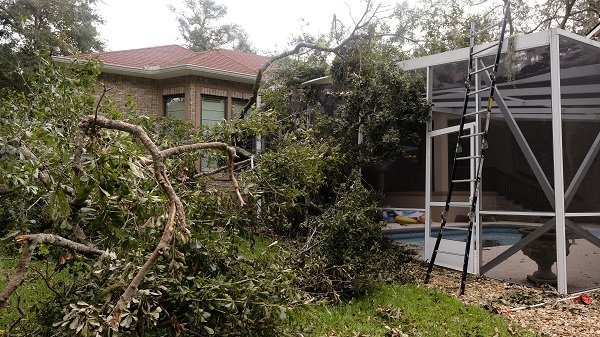
Storms are just one cause of downed trees that damage property.
Fallen trees and branches are a significant cause of damage and power loss after a thunderstorm rolls through. But if a neighbor’s tree falls on your property and causes damage, who is responsible?
In most cases, it’s your homeowner policy that will cover the cost of the damages, subject to the policy’s coverage language. At first, that may not seem fair. But reverse the situation: What if YOUR tree fell on your neighbor’s yard causing damage? Your neighbor would be responsible for the repair and cleanup of the property.
Keep in mind that lightning or wind isn’t anyone’s fault; it’s just an act of Mother Nature.
However, Mother Nature may not always be in charge. In those cases, responsibility may be with the tree’s owner. For example, if your do-it-yourself neighbor attempts to cut down the tree and is negligent in the process, your neighbor may be responsible for damage to your property. In addition, if the tree was diseased and your neighbor was aware of its condition in advance, this could create a level of negligence that could make them liable. Of course, the same would be true for you if your tree happened to fall on their property.
The best recommendation is to carefully inspect the trees on your property and take action to prevent hazardous conditions. Consider hiring a professional arborist who can detect diseased trees or trim dead branches that could fall and cause damage. Signs of possible trouble include:
- Broken, dead or hanging branches: Check for damage after storms
- Weak V-shaped branch unions (as opposed to u-shaped): These show that a branch is not strongly attached to the trunk
- Deep splits or cracks: If these extend into the wood, the tree is already failing
- Cavities on the trunk: Missing wood or sunken bark mean the tree may be hazardous
Finally, review the coverage in your homeowner policy and check with your local, independent agent if you have any questions.
MORE INFORMATION
Infographic: Signs Of A Dangerous Or Dying Tree
This loss control information is advisory only. The author assumes no responsibility for management or control of loss control activities. Not all exposures are identified in this article. Neither The Cincinnati Insurance Company nor its affiliates or representatives offer legal advice. Consult with your attorney about your specific situation. Contact your local, independent agent for insurance coverage information.
